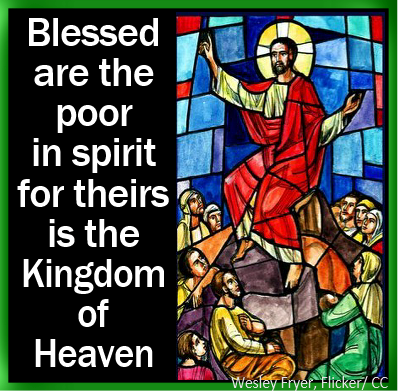29 January 2022
Zephaniah 2:3; 3:12-13 1 Corinthians 1:26-31 Matthew 5:1-12
The Beatitudes: Jesus’ Recipe for happiness
In last Sunday’s gospel we heard how Jesus launched his messianic mission with a simple, clear message and exhortation: ‘Repent for the Kingdom of Heaven is at hand’. In today’s gospel Matthew introduces to the beatitudes of Jesus. In them we see the kind of repentance or change of heart Jesus is asking of us, if we wish to enjoy the blessings of God’s Kingdom and experience the kind of happiness God is offering us.
In the Beatitudes Jesus is not giving his disciples a new set of commandments like the ten commandments Moses received on Mount Sinai for the people of Israel. The Jews in Jesus’ time already had enough commandments and rules. Six hundred and thirteen of them are found in the Torah. So, more rules would be bad news, not good news. The beatitudes are good news. They are declarations of blessing. They are Jesus’ recipe for happiness. The word ‘blessed’ occurs nine times in today’s gospel reading. Declarations of blessing are found throughout the bible. The first psalm opens with the beatitude: ‘Blessed is the person who follows not the counsel of the wicked… but who delights in the law of the Lord’ (Ps 1:1-2). The first beatitude in Luke’s gospel declares Mary blessed because she believed ‘that the promise made her by the Lord would be fulfilled’ (Lk 1:45).
What is surprising about the beatitudes of Jesus’ are the categories of people he declares to be blessed. They are not the prosperous, powerful or famous, not those we would consider particularly blessed or happy. Indeed, his beatitudes turn upside down the values and attitudes that are dominant in our world. They propose an alternative way of life to that which most people freely choose. They articulate a vision of the good life seen from the perspective of a God who is Love. This was the vision of life Jesus himself embodied and lived. In the words of the American Evangelist, Carl F. Henry, ‘Jesus clothes the beatitudes with his own life’.
For the sake of the Kingdom that he proclaimed, Jesus renounced power and prestige and chose the way of powerlessness. He was truly ‘poor in spirit’ and identified himself with the lowly of this world, not with the high and mighty. He was merciful, meek and compassionate. He mourned with the sorrowing. He was a peace-maker who offered the violent no resistance. Yet, he was uncompromising in his commitment to all who were exploited and suffered injustice. He was persecuted for the cause of right and finally handed over to death. Everything he said and did flowed from, and gave concrete expression to, the power of the Father’s love at work in him.
The beatitudes only make sense in the context of the Kingdom of God. In this Kingdom it is not the rich, the successful, and the powerful who are blessed, but the meek and lowly. These are the people God chooses as his privileged instruments in the service of his Reign. In the striking words of St Paul in today’s second reading, ‘God chose what is foolish in the world to shame the wise; God chose what is weak in the world to shame the strong; God chose what is low and despised in the world, things that are not, to reduce to nothing things that are, so that no one might boast in the presence of God (1 Cor 1:27-29). These are the people through whom God works to realise his dream of a world transformed by the power of Love: a world where the weak are protected and none go hungry; a world where the riches of creation are shared and everyone can enjoy them; a world where all peoples live in harmony and mutual respect; a world where peace is built on justice, and justice is guided by love.

While the beatitudes are not a new set of rules for the disciples of Jesus, they constitute a radical challenge and call to action. We cannot live them without undergoing a profound change of heart. They go way beyond the moral requirements of The Ten Commandments, which the rich young man in the Gospel of Luke was easily able to observe. They require that we imitate the example of the self-giving love of Jesus, resisting the idolatrous pull of wealth and power. They involve not merely a personal observance of ethical rules, but a rejection of the obscene inequalities that mar our world, and a tenacious struggle for a more just participation by all in the gifts of the earth. They involve an unswerving commitment to mirroring on earth the ‘Kingdom of Heaven’ and making the world a place of truth, love, compassion, justice, freedom and peace. I will end this homily with a simple and inspiring reflection on the beatitudes from the pen of Fr Flor McCarthy, SDB:
The beatitudes are the badges of a true disciple of Christ.
They are the marks of a child of God.
They make us rich in the sight of God.
They open our minds and hearts
to a new way of seeing and judging.
They give us a whole new set of bearings.
The things the beatitudes stand for
are very beautiful and very precious –
things such as peace, goodness, joy, love,
gentleness, compassion, mercy, integrity….
A person who lives according to the beatitudes
is already living in the kingdom of heaven.
Eternal life will merely be the full blossoming
of a plant that is green with life.
Fr Michael McCabe SMA
To listen to an alternative Homily from Fr Tom Casey of the SMA Media Centre, Ndola, Zambia please click on the play button below.
|
|

